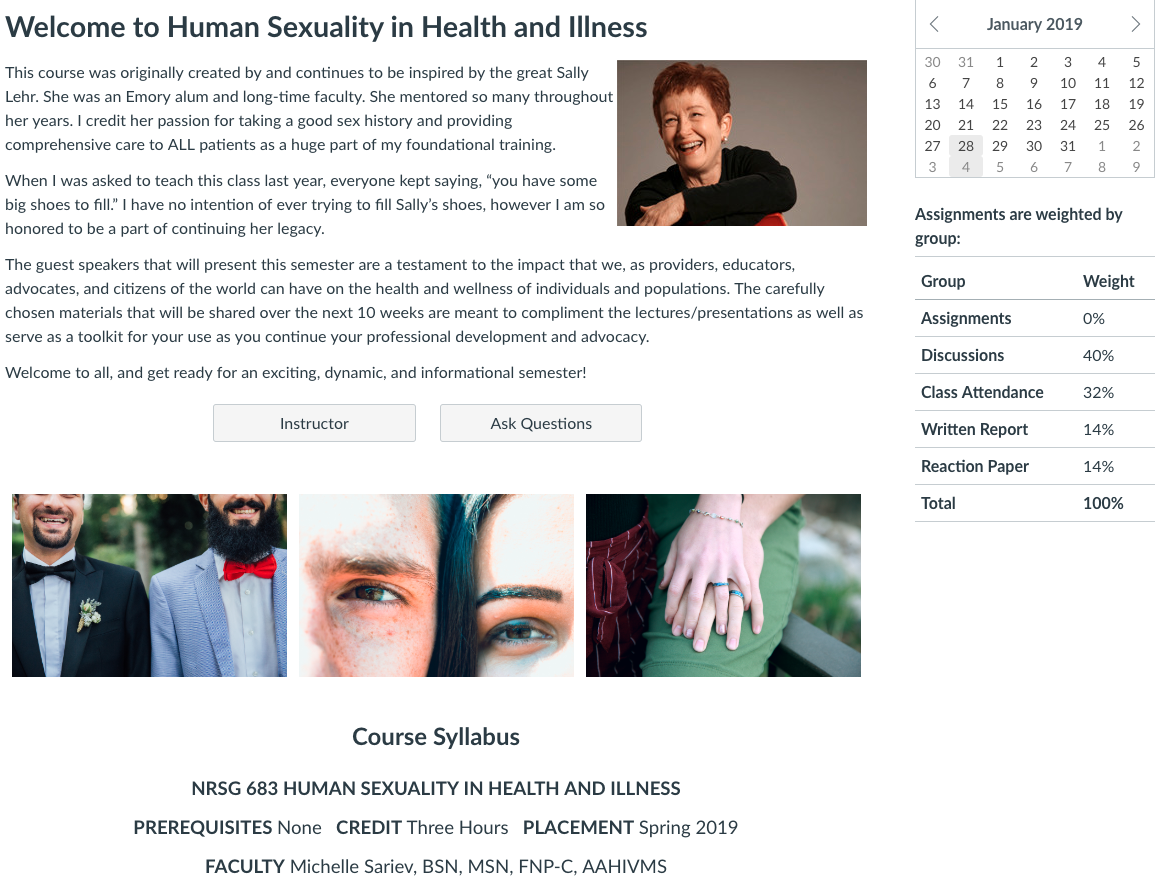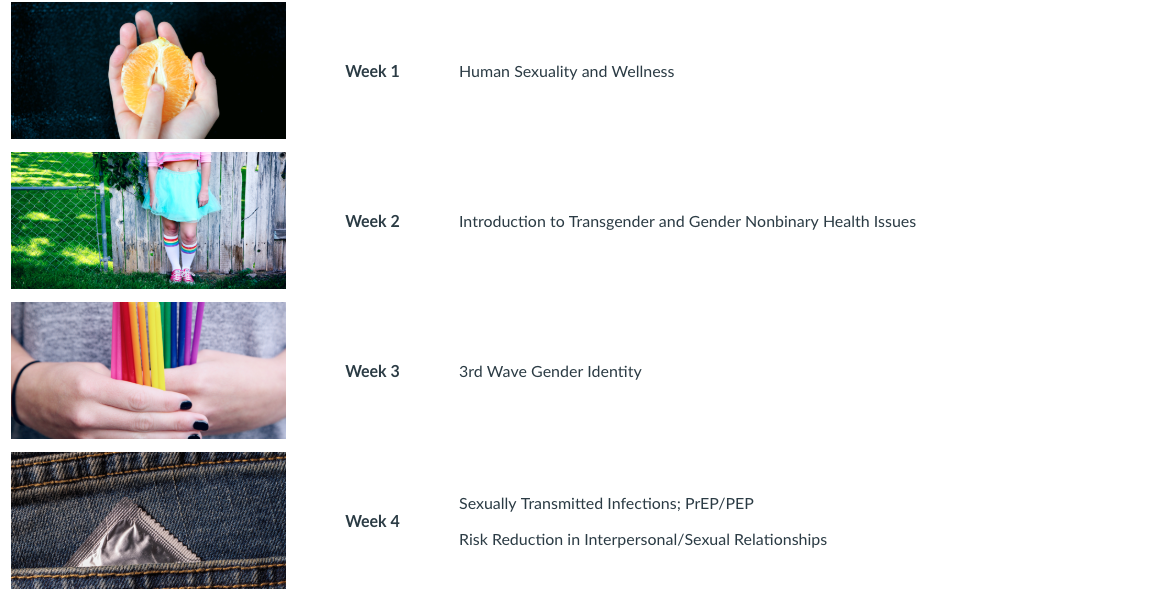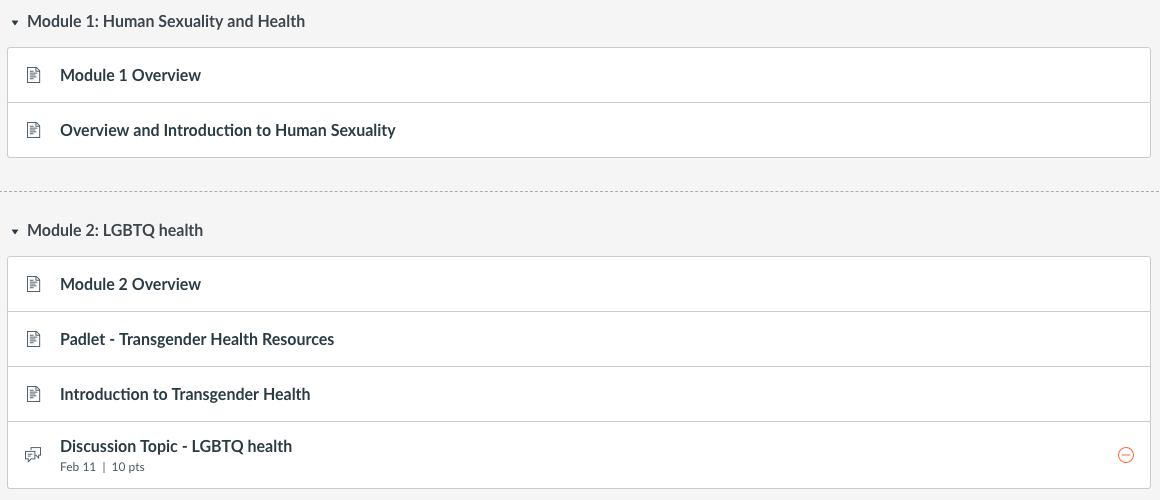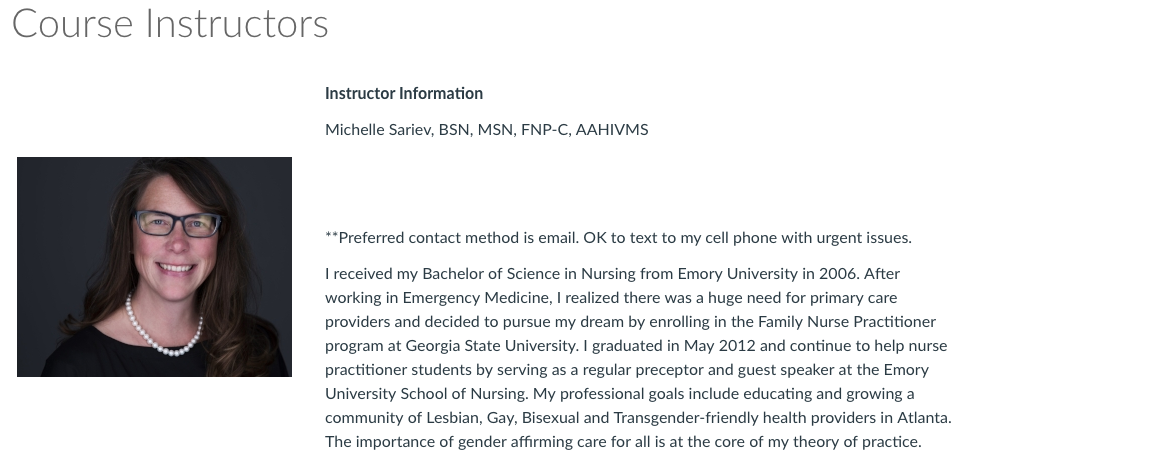This article is part of a series featuring faculty who participated in the Teaching with Canvas 2018 cohort.
Michelle Sariev teaches “NRSG 683: Human Sexuality,” a graduate course for up to 30 students in the Nell Hodgson Woodruff School of Nursing. Michelle is a Family Nurse Practitioner with a focus on gender affirming, LGBTQ friendly practice and education. In “Human Sexuality,” Michelle invites practicing health professionals and advocates as guest lecturers to share current information based in field experience. Students use the materials Michelle and guest lecturers assign, present, and recommend for reference long after the class ends.
Michelle Sariev’s Teaching with Canvas Goals
Michelle used Canvas to teach “Human Sexuality” in Spring 2018. She posted materials for students in pages and the syllabus area, organized pages chronologically using modules, sent announcements, and incorporated online discussions and writing submissions. Michelle’s goals in joining the Teaching with Canvas cohort were to add engaging online content and learn more about Canvas before teaching “Human Sexuality” in Spring 2019. She wrote:
It is my intention to better use Canvas to provide more opportunities for students to be exposed to material that is relevant to this course. There is so much information out there in regards to sexuality, but many of the textbooks are outdated. This means that journal articles, guest speakers, and audiovisual materials are very important tools in providing a comprehensive course. Due to the limitations of once a week meetings, this course in particular would benefit from a robust use of Canvas.
Outcomes from the Program
When the 2018 Teaching with Canvas program began, Michelle was paired with Susan Detrie (a former TLT team member who is now an instructional designer in the Rollins School of Public Health). Michelle and Susan built a graphically enhanced homepage so that students can see the topics for weekly class meetings; topics are linked to resource pages where students access readings, videos, slide decks, etc. They also developed four modules based on course topic areas. Using the backwards design approach, Michelle mapped existing assessments to course objectives to confirm evidence of learning. Based on that design exercise, she found that her graded assignments in Spring 2018 were a good fit and decided to keep the same assessment and grading policies.
Michelle worked with me (Sam Timme) starting in late October when Susan left TLT for her new role. We focused on organizing course materials so that students can use Canvas’s ePub course export feature when the course ends. The ePub course export feature lets students create and download an ebook containing all Canvas contents (Syllabus body, Announcements, Assignment instructions, and Pages included in Modules). Michelle’s Canvas modules are organized topically rather than chronologically. This way, the materials will be easier for students to reference after the course ends.
Michelle also embedded a Padlet board in each course module as a new way for students to contribute online. She lets students post relevant web links to a pin-board without requiring them to log in separately to Padlet. To add to the board, students just double click and write their post. Michelle looks forward to seeing what students create together in these informal collaborative spaces.
Human Sexuality (NRSG 683) Showcase




Reflecting on the TwC Experience – Interview
Q: How did the TwC program improve or otherwise change your use of Canvas?
Michelle Sariev: My Canvas course became much better organized after the TwC program. Additionally, I have been able to share more supplemental resources, and I am using the Assignments and Gradebook feature much more efficiently.
Q: What was the most challenging part of the program? What was the most rewarding?
Michelle Sariev: The most challenging part of the program was realizing how many great features there are in Canvas and finding the time to utilize them as well as selecting the features that are most useful for my class.
The most rewarding part so far has been that I have had less questions from my students about the Canvas course and the course content.
Q: What are your future goals with Canvas going forward?
Michelle Sariev: To continue to build upon the foundation of my current course and even further improve the organization of my course.
Q: What advice would you give to faculty in the next cohort?
Michelle Sariev: I think that planning for some substantial dedicated time outside the cohort meetings in which to work on the content and organization of the Canvas course is key.
More about ePub course exports
Students can download an ePub-formatted ebook of Canvas content. Uploaded files are packaged in a separate zip file. A clear, shallow folder structure and a consistent filename scheme in the course Files area make the zip file export convenient for students to use.
This feature is not active in Emory’s Canvas system by default. To let students create exports, go to course Settings, click the Feature Options tab, and flip the “ePub Exporting” switch. Then share the guide with your students: https://community.canvaslms.com/docs/DOC-10682
More about Padlet
Padlet boards and feeds are similar to other social media. It includes an option to let students post without creating their own accounts making it very easy to use. http://www.padlet.com
Now Accepting Applications for Teaching with Canvas
Applications for the second Teaching with Canvas cohort are now open! Teaching with Canvas aims to provide Emory faculty with a supportive and shared experience while they explore how thoughtful Canvas course design supports instructional strategies such as student interaction, communication, collaboration, and field work. Applications are due April 3. Click here to learn more, including how to apply.
Header image by Steve Johnson on Unsplash
